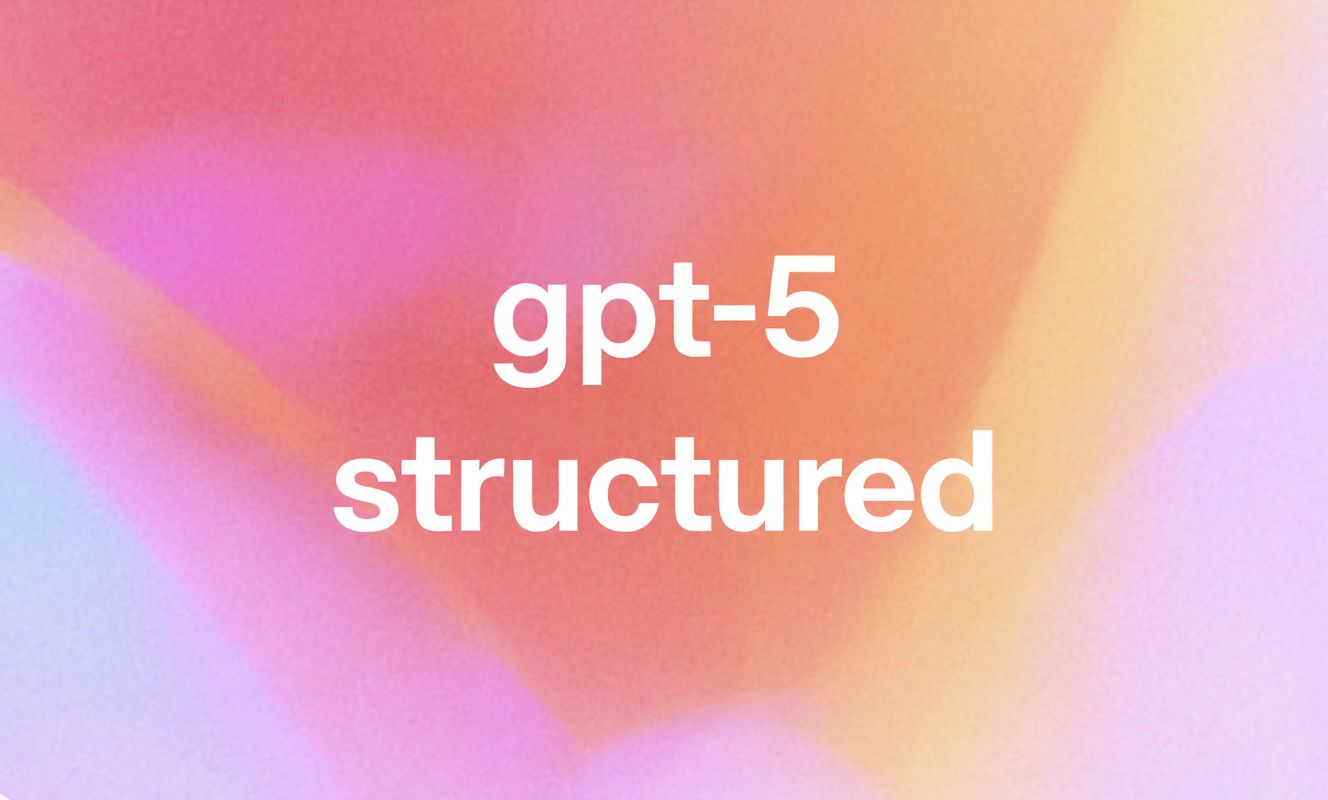openai/gpt-5-structured ❓📝🖼️✓🔢 → ❓
About
GPT-5 with support for structured outputs, web search and custom tools

Example Output
Prompt:
"Use the web to find a news article headline from today"
Output
{"text":"Here’s a news headline from today, August 14, 2025:
- Stocks take a breather, Fed rate-cut drumbeat weighs on dollar. — Reuters. (reuters.com)","response_id":"resp_689e0444e5888197b4ab813be288b7c003469ce22af060e9"}
Performance Metrics
8.64s
Prediction Time
8.65s
Total Time
All Input Parameters
{
"model": "gpt-5-nano",
"tools": [],
"prompt": "Use the web to find a news article headline from today",
"verbosity": "medium",
"image_input": [],
"json_schema": {},
"simple_schema": [],
"input_item_list": [],
"reasoning_effort": "low",
"enable_web_search": true
}
Input Parameters
- model
- GPT-5 model to use.
- tools
- Tools to make available to the model. Should be a JSON object containing a list of tool definitions.
- prompt
- A simple text input to the model, equivalent to a text input with the user role. Ignored if input_item_list is provided.
- verbosity
- Constrains the verbosity of the model's response. Lower values will result in more concise responses, while higher values will result in more verbose responses. Currently supported values are low, medium, and high. GPT-5 supports this parameter to help control whether answers are short and to the point or long and comprehensive.
- image_input
- List of images to send to the model
- json_schema
- A JSON schema that the response must conform to. For simple data structures we recommend using `simple_text_format_schema` which will be converted to a JSON schema for you.
- instructions
- A system (or developer) message inserted into the model's context. When using along with previous_response_id, the instructions from a previous response will not be carried over to the next response. This makes it simple to swap out system (or developer) messages in new responses.
- simple_schema
- Create a JSON schema for the output to conform to. The schema will be created from a simple list of field specifications. Strings: 'thing' (defaults to string), 'thing:str', 'thing:string'. Booleans: 'is_a_thing:bool' or 'is_a_thing:boolean'. Numbers: 'count:number', 'count:int'. Lists: 'things:list' (defaults to list of strings), 'things:list:str', 'number_things:list:number', etc. Nested objects are not supported, use `json_schema` instead.
- input_item_list
- A list of one or many input items to the model, containing different content types. This parameter corresponds with the `input` OpenAI API parameter. For more details see: https://platform.openai.com/docs/api-reference/responses/create#responses_create-input. Similar to the `messages` parameter, but with more flexibility in the content types.
- reasoning_effort
- Constrains effort on reasoning for GPT-5 models. Currently supported values are minimal, low, medium, and high. The minimal value gets answers back faster without extensive reasoning first. Reducing reasoning effort can result in faster responses and fewer tokens used on reasoning in a response. For higher reasoning efforts you may need to increase your max_completion_tokens to avoid empty responses (where all the tokens are used on reasoning).
- enable_web_search
- Allow GPT-5 to use web search for the response.
- max_output_tokens
- Maximum number of completion tokens to generate. For higher reasoning efforts you may need to increase your max_completion_tokens to avoid empty responses (where all the tokens are used on reasoning).
- previous_response_id
- The ID of a previous response to continue from.
Output Schema
Output
Example Execution Logs
Response completed: resp_689e0444e5888197b4ab813be288b7c003469ce22af060e9 Model variant: gpt-5-nano Input token count: 25135 Output token count: 247 - Reasoning tokens: 192 Total token count: 25382 TTFT: 0.30s
Version Details
- Version ID
9f4cd9ec1133f55d442aeb426e42df5180a56e79a33183623611d62d4c3b44ae- Version Created
- January 21, 2026